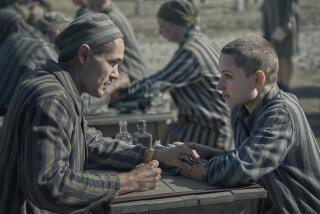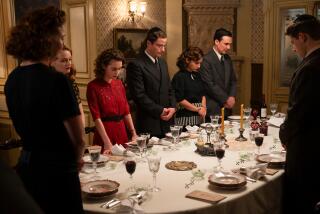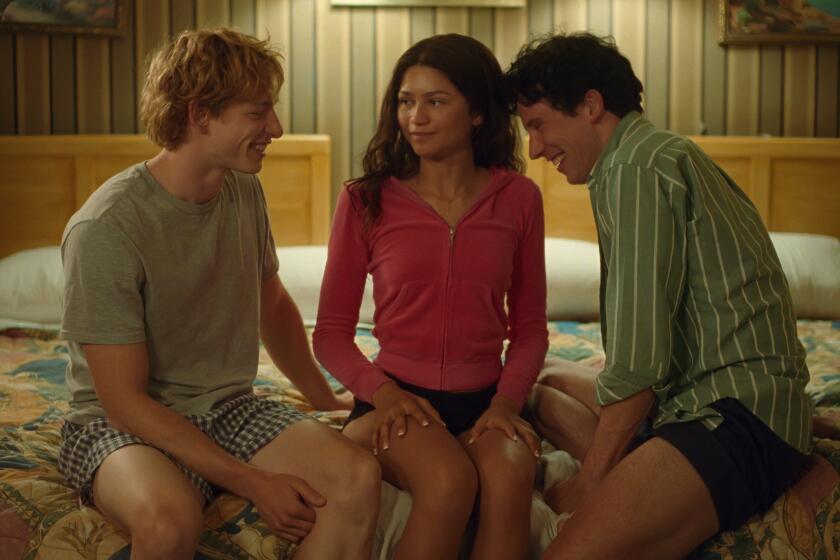Perspective: Holocaust films and the Oscars
The office pools have closed, let the drama begin: Silent film or 3-D talkie, Streep’s Thatcher or Williams’ Marilyn or maybe Viola Davis? Scorsese again? For me, the most fascinating question is which of the five foreign-film nominees will win.
If you picked Asghar Farhadi’s “A Separation” — a visceral chamber drama exposing all manner of class, religious and gender fissures in contemporary Iran — you went for the favorite, winner of numerous critics’ awards, “a movie you’ll love from a country you hate,” as the late Bingham Ray jokingly promoted “The White Balloon.” If you selected the Israeli production “Footnote,” you’ve identified yourself as a dreamer, choosing the longest of long shots, a post-Seinfeld comedy about father and son Talmudic scholars by director Joseph Cedar.
If, however, you opted for Agnieszka Holland’s “In Darkness” — a harrowing, emotionally exhausting account of Polish Jews hiding from the Nazis in the sewers of Lvov — you allied yourself with history. In the 52 years since Shelley Winters won a supporting actress Oscar for “The Diary of Anne Frank,” there have been 20 nominated features — including foreign-language and documentary films — that treated the Holocaust from the perspective of its victims.
Only two have gone home unrewarded, one directed by Holland. (In 1985, her “Angry Harvest” was defeated by “The Official Story,” another tale of political atrocity, dramatizing Argentina’s “dirty war.” The other, also in a contest in the foreign-language film category, came the year after “The Diary of Anne Frank,” when Gilles Pontecorvo’s “Kapo,” featuring Susan Strasberg, the on-stage Anne, as a privileged Auschwitz inmate, lost to Ingmar Bergman’s “The Virgin Spring.”)
No winner has been as successful as Steven Spielberg’s 1993 “Schindler’s List,” which, nominated for 12 Oscars, took seven (including best picture), but interest in the subject predates Spielberg’s film. After “Maus” was published in 1986, Art Spiegelman received so many movie offers that, as he said when reached by phone, it’s “not even a number.” Spiegelman fired his agent because “he kept approaching me with deals after I asked him not to.” The persistence amazed him. “There was some guy with a gold chain who, when I told him that I didn’t want ‘Maus’ made into a movie said, ‘Yes — but if you did, what kind of movie would it be?’”
Spiegelman attributes this fascination to multiple factors — the Holocaust as Western civilization’s “defining trauma,” an ongoing “culture of victimization,” the perennial appeal of the Nazi villain and an American desire to have “entertainment mixed with education.”
I believe that the Holocaust resonates with the Academy of Motion Picture Arts and Sciences voters for a similar reason, namely the hope that movies be something more than just entertainment, although several Oscar-winning movies on the subject of Nazis and Jews, notably “The Producers” and “Cabaret,” have surely been that.
On the other hand, it is undeniable that, whatever their intentions, few if any Oscar-nominated movies that treat the Holocaust have the audacity of Spiegelman’s comic book or the gravitas of Claude Lanzmann’s “Shoah” — and may even seem superfluous beside these magisterial works.
In any case, “Schindler’s List” was no anomaly: 11 films were nominated before Spielberg’s and 10 afterward. “Judgment at Nuremberg” won lead actor (Maximilian Schell) and adapted screenplay (Abby Mann) for 1961; the Czech-language “Shop on Main Street,” starring Yiddish diva Ida Kaminska, and the Italian-language “Garden of the Finzi-Continis,” directed by Vittorio De Sica, won foreign-language film in 1966 and 1972 respectively. Two classics of Holocaust Lite, “The Producers” took home the trophy for original screenplay for 1968, while 1972’s “Cabaret” collected eight Oscars.
“Genocide” won for documentary in 1981, three years after NBC presented the miniseries “Holocaust” and four years before the epic documentary feature “Shoah”; Meryl Streep received her second Oscar for 1982’s “Sophie’s Choice.” In 1988, Marcel Ophüls, whose documentary about Nazi-occupied France “The Sorrow and the Pity” lost in 1971 to “The Hellstrom Chronicle,” won with his account of Nazi butcher Klaus Barbie, “Hotel Terminus.”
In the wake of “Schindler’s List,” a Holocaust nomination in the documentary category was near obligatory: “Anne Frank Remembered” won for 1995, “The Long Way Home” for 1997, “The Last Days” for 1998 and “Into the Arms of Strangers: Stories of the Kindertransport” for 2000. The fictional winners were more surprising.
Roberto Benigni’s 1998 “Life Is Beautiful,” a comedy set in a concentration camp, won for foreign-language film as well as lead actor. As tasteless as the movie may have been, the irrepressible Benigni eclipsed it with his triumphant march to the stage; eschewing the aisle, the exultant actor-director clambered across seats and over bodies, waving, mugging and all but singing “There’s No Business Like Shoah Business,” to claim his award.
“The Pianist”, like “Schindler’s List,” based on a true story, won Holocaust survivor Roman Polanski the director’s award for 2002, along with actor (Adrien Brody) and adapted screenplay (Ronald Harwood) awards — one wonders if it wouldn’t have beaten “Chicago” for best picture were it not directed by a fugitive from the American justice system. The little-seen Austrian feature “The Counterfeiters,” also based on fact, won over “Beaufort” for 2007. The next year, “The Reader” redeemed one of five nominations in snagging lead actress for Kate Winslet in the role of a former SS guard.
The closest that a Nazi-themed movie has come to being shut out, however, was at the next ceremony, when Quentin Tarantino’s “Inglourious Basterds” received eight nominations but only a single victory — somewhat pyrrhic in that Christoph Waltz won supporting actor for his role as edgy Nazi villain. (The nearest equivalent was the wartime Oscar given the scarcely less naturalistic Disney cartoon “Der Fuehrer’s Face.”)
Will Holland get hers? History suggests that she won’t. Not only was “Angry Harvest” denied, but, in what was then a full-blown scandal, Germany declined to put forth Holland’s 1992 reality-based Holocaust drama “Europa, Europa” — which won the foreign-language film awards from the New York Film Critics Circle and the National Board of Review — for Oscar consideration. “They hate this subject, they really hate it,” the director angrily told the New York Times after the Oscar nominees were announced. “My presence and my cinema is an offense to these people.”
Perhaps these awards do matter. Rather than propose a probable winner, the German Export Film Union preferred to nominate nothing at all — a remarkable statement in itself, announcing the presence of an absence.
J. Hoberman, the former longtime film critic of the Village Voice, is the author of “Bridge of Light: Yiddish Film Between Two Worlds,” “The Dream Life” and other books.
More to Read
The biggest entertainment stories
Get our big stories about Hollywood, film, television, music, arts, culture and more right in your inbox as soon as they publish.
You may occasionally receive promotional content from the Los Angeles Times.










